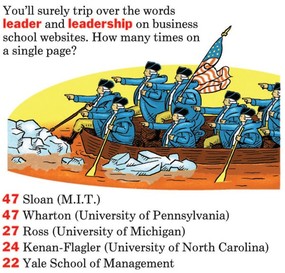Are you a leader?
One way to find out is to take one of the many online tests available and see for yourself. Just beware, most pitch you a service like getting training to enhance your skills or products like Ginsu knives at the conclusion...
Here are a few to try... and, of course, please search on your own as well. The number available is astronomic.
Another way is to forgo the testing (or not), assume you are not yet the leader you wish you were -- whatever your own personal vision of a leader is -- and take a class.
And, here is the good news: unlike the sketchy origins of many of the online tests (but I did love those knives), the best business schools in the United States are offering courses designed to turn you into the next Caesar, Napoleon, Bolivar, Mao, Washington, Shaka Zulu -- take your pick. And by the way, my choice is not meant to be political -- I could have added Gandhi, King and Mandela just as easily. I was making a point.
"Can You Learn to Lead?" by Duff McDonald, which was posted on the New York Times last week, chronicles the courses available and some of the controversy over the very premise of its possibility.
In fact, leadership has become so important to the famous universities that have trained and churned out so many excellent and famous managers that their use of the word has achieved leaderbabble status:
I will leave it to you to read the full article and form your own opinion...
But a few highlights:
"Is leadership an emergent quality, both situational and context-specific? Or is it something you can actually teach? That is, can you be a leader without ever leading something? Business schools insist you can."
"John Van Maanen, a professor of management at M.I.T. Sloan who teaches a course named 'Leading Organizations,' isn't so sure it can [be taught]. 'Even today, three-plus decades in, there's no real definition of it,' he says. 'We can make people more conscious of ethical dilemmas in business, of the difficulty of directing people in times of adversity, and the confidence and communication skills necessary to do so. But the idea that such skills can be transmitted so that you can lead anybody at any time, that's ideologically vacuous.'"
However, he adds, and here is the money shot...
"'It's difficult not to be frustrated by the excessive focus on it,' he says, 'but it's become so popular that we apparently can't teach enough of it.'"
McDonald ends his (excellent) piece with the following quote:
"As Joseph C. Rost outlined in his 1991 book, 'Leadership for the 21st Century,' the lack of agreement on the matter means that leadership is practically 'anything anyone wants to say it is,' and leaders are 'anyone who is so designated.'"
And there you have it -- think of the great leaders of history and the great historic movements they led (and, yes, I know the theory that huge change comes about by small actions -- true, but there has always been a leader/leaders to galvanize) not sure I could look at them, at least not at my heroes and say they were just anyone so designated...
And maybe that is the problem in the world today. The problem of online testing for leadership; of degrees in leadership (the professors see themselves as leaders in the classroom -- and some no doubt are); of confusing entrepreneurialism with leadership and entrepreneurs as leaders (although some are, in fact); of politicians who confuse power to disrupt with leadership; of other politicians who confuse access to public forum as leadership; of business heads who mistake fear with leadership; and other business heads who confuse title and leadership... and on and on....
I truly believe we are faced with a dearth of true and inspiring leaders and true and inspiring leadership.
All of which leads me to the following thought...
"Great companies don't hire skilled people and motivate them, they hire already motivated people and inspire them." - Simon Sinek, Start with Why: How Great Leaders Inspire Everyone to Take Action
The problem is you need the leaders to inspire the already motivated and that is where we are falling down.
I'd further argue the EQ, Emotional Intelligence is key to leadership, and when leaders fall off the tracks is when they go deaf...
"How to Be Emotionally Intelligent" by Daniel Goleman is another New York Times piece that I think rounds out the first. In it Goleman outlines his short but concise list of competencies and they are worth reading:
1. SELF-AWARENESS
Realistic self-confidence: You understand your own strengths and limitations; you operate from competence and know when to rely on someone else on the team.
Emotional insight: You understand your feelings. Being aware of what makes you angry, for instance, can help you manage that anger.
2. SELF-MANAGEMENT
Resilience: You stay calm under pressure and recover quickly from upsets. You don't brood or panic. In a crisis, people look to the leader for reassurance; if the leader is calm, they can be, too.
Emotional balance: You keep any distressful feelings in check -- instead of blowing up at people, you let them know what's wrong and what the solution is.
Self-motivation: You keep moving toward distant goals despite setbacks.
3. EMPATHY
Cognitive and emotional empathy: Because you understand other perspectives, you can put things in ways colleagues comprehend. And you welcome their questions, just to be sure. Cognitive empathy, along with reading another person's feelings accurately, makes for effective communication.
Good listening: You pay full attention to the other person and take time to understand what they are saying, without talking over them or hijacking the agenda.
4. RELATIONSHIP SKILLS
Compelling communication: You put your points in persuasive, clear ways so that people are motivated as well as clear about expectations.
Team playing: People feel relaxed working with you. One sign: They laugh easily around you.
Bottom line?
If you think you can learn leadership, this is as good a place as any to start.
Sharks are not leaders; predators are not leaders -- do not confuse getting ahead at any cost with leadership....
Work on your EQ... and see where you get...
In my book?
Leaders lead -- behind the scenes in times of calm and out in front in times of turmoil.
Leaders listen -- always... have ideas but be ready to replace them in an instant if someone has a better one, and if they don't get yours going ASAP.
Leaders care -- you are not the only one with a life... and if you don't have one, don't impose that void on anyone -- but leaders do have lives.
Leaders win and lose -- and when they win, they give the credit away... and when they lose, they assume the accountability.
Leaders are relentless -- they never give up... no matter what.
Leaders compromise -- because sometimes being relentless means never giving up, equals compromise.
Leaders smile -- because it never hurts to smile.
Leaders are leaders -- because that is what they do.
And... listen:
"Management is doing things right; leadership is doing the right things." - Peter Drucker
Do the right thing... always....
So take the tests, register for the courses. Me? I'm reading up on my heroes.
What do you think?


